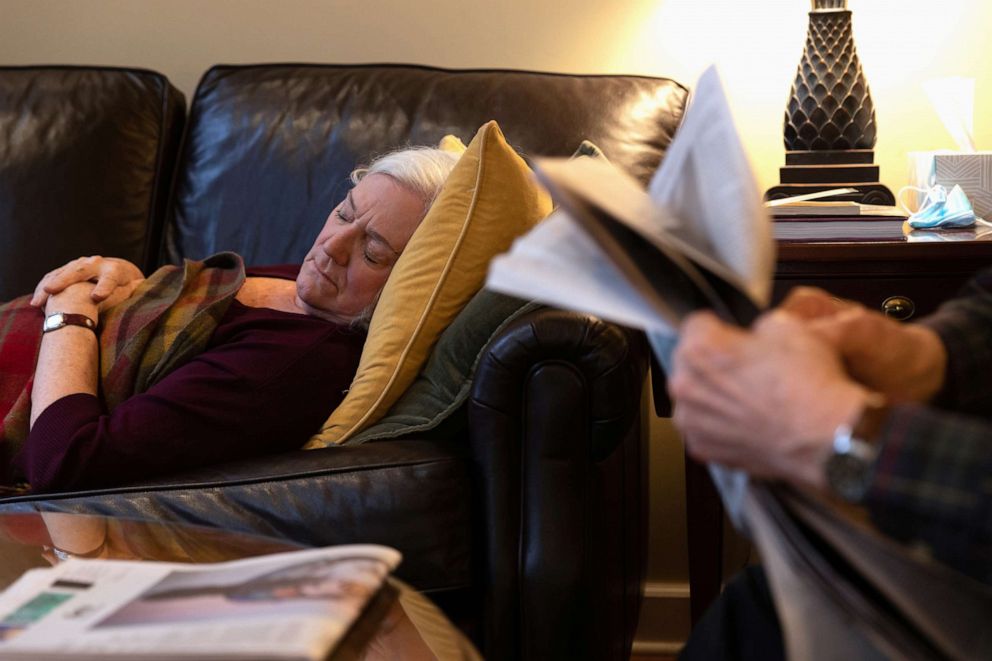Inside the 'cyclone' of brain fog many COVID-19 long-haulers are still experiencing
A new study found some survivors are suffering from ongoing neurological issues.
One day, suddenly, Hannah Davis couldn't read her latest text message. The bubble of words on her glowing phone screen stared back at her as her eyes and mind tried, and failed, to adjust and react. It was her first clue that something wasn't right; then came the fever, the headaches, the muscle pain, the tremors.
That was in late March of 2020. For Davis, it's been a year of brain fog, out of whack heart rate, phantom smells and memory loss so bad she initially feared she had some degenerative condition.
Her COVID-19 "long-haul" has manifested largely in neurological issues which, over time, have gotten worse.
"I still have what I feel like is a 48-hour memory," Davis, 33, told ABC News.
As a young woman who studied machine learning and artificial intelligence, thinking critically is a big part of her life -- which makes dealing with her lingering, often debilitating symptoms even harder.
During her day, she often has "difficulty finding words" when trying to voice an idea. But that's just the start.
"In the beginning I would wake up with my arms just completely numb and no feeling in them," she said. "I've had phantom smells, tremors ... On top of the cough and shortness of breath, and everything that was on the CDC symptom list, there was just this whole other category."
What was once understood as a respiratory virus has now emerged, for many, as an all-out attack on the system.

A new study is now exploring what Davis and many other long-haulers have felt for some time: COVID-19 may have long-term impacts on the body and the brain.
The peer-reviewed research from Northwestern University School of Medicine released Tuesday surveyed 100 patients across 21 states and found that 85% of participants experienced four or more neurological symptoms, more than six weeks after they were infected, and even if the illness was not severe enough to require hospitalization.
Reported issues included brain fog, fatigue, dizziness, joint and muscle pain, headaches, numbness and tingling.
Half of the patients surveyed did not have confirmed COVID-19 tests -- a study limitation perhaps caused by the scarce diagnostic tools during the pandemic's early days, when people who wanted a test couldn't always get one.
The study comes as experts accrue more knowledge about the potential cognitive complications caused by the coronavirus.

In December, the Patient-Led Research Collaborative put out a study -- which Davis helped draft -- of emerging long-haul symptoms.
Though not yet peer reviewed, it signals a clear pattern: Across more than 3,700 self-described long haulers in 56 countries, more than 85% reported experiencing brain fog and cognitive dysfunction.
Some of the most common symptoms among them were poor attention or concentration, difficulty thinking, difficulty with executive functioning and slowed thoughts.
Even seven months after they were first infected, more than half of respondents experienced memory impairments and trouble with recall.
Headaches, insomnia, vertigo, neuralgia, neuropsychiatric changes, tremors, sensitivity to noise and light, phantom smells, tinnitus and other sensorimotor symptoms were also common among respondents.
A study not yet peer reviewed from Survivor Corps, in collaboration with Indiana University, University of California Irvine and the Mayo Clinic, was released Tuesday. It surveyed more than 5,000 self-reported long-haulers recruited from online COVID-19 support groups and showed that more than half of respondents had prolonged difficulty concentrating and more than a third experienced long-term memory problems and dizziness.

Laura Gross, 72, tested positive for the virus in April of 2020. Her unshakable brain fog plagued her for months. She describes it as being caught in a "cyclone."
"We have all these folders in our head, just like a computer -- and we all know intuitively how to go right through and connect to each immediately," Gross said. "COVID blows it all up and makes it go swirling all around."
"It just broke my heart," Gross continued. "It broke me to the point that I wasn't who I am, and I couldn't find me. It's awful not to be who you are."
In February, the National Institutes of Health (NIH) announced the launch of their four-year $1.15 billion initiative to study what causes long-term COVID symptoms. Their aim is to identify the root cause -- and eventually, the means of treating -- long-term COVID-19.
"The damage caused by COVID seems to literally know no bounds," Survivor Corps founder Diana Berrent said. "Every organ is vulnerable, including the brain, and we must start to understand the mechanisms of long-term COVID so we can offer a road to recovery for the millions suffering."
Davis says grappling with her symptoms has been a daunting feat.
"It's been scary," she said. "But I'd rather try to find answers rather than just wait."
ABC News' Sony Salzman and Eric M. Strauss contributed to this report.




